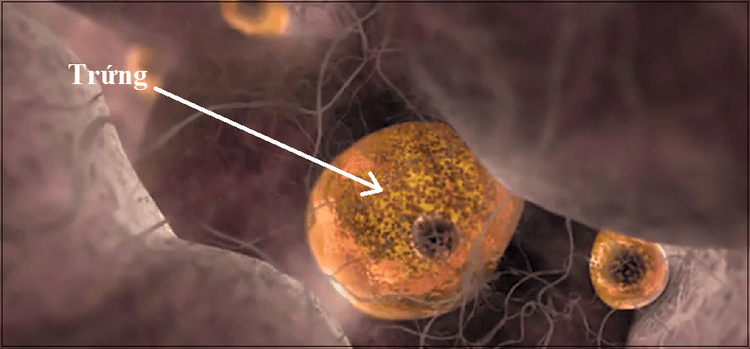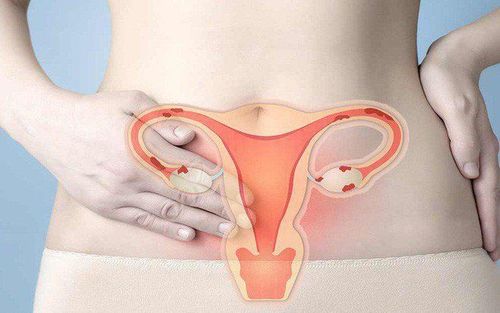This is an automatically translated article.
The article is professionally consulted by Specialist Doctor II Huynh Thi Hien - Obstetrician and Gynecologist - Department of Obstetrics and Gynecology - Vinmec Nha Trang International HospitalUnexplained infertility is a diagnosis no couple wants to accept, yet it is a common problem these days. An estimated one in four couples will have fertility problems with no known cause. Infertility can be from the wife or from the husband or from both or a combination of factors that prevent pregnancy.
1. Definition of unexplained infertility
Infertility is defined as the inability to get pregnant despite regular sex and without using any contraception for at least 6 monthsUnexplained infertility is infertility that is visited Clinical examination and laboratory tests in both husband and wife still could not detect the cause of this condition.
2. Symptoms
The main problem with infertility is not getting pregnant. A woman may have no other obvious symptoms or irregular or absent menstrual periods. Husbands with infertility can be normal or have some health signs such as changes in hair growth or sexual dysfunction.The main symptom mainly relies on tests for spouses to find the cause of the disease. They will eventually get pregnant naturally or through assisted reproduction.
When to see a doctor? You probably don't need to see a doctor unless you've been trying to conceive for at least 6 months to a year.
A wife should talk to her doctor sooner if:
Are 35 years of age or older and have been trying to conceive for six months or longer Over 40 years of age Irregular menstrual periods Heavy menstrual cramps Known problems reproductive health problems Have been diagnosed with endometriosis or gynecological inflammatory diseases Have had multiple miscarriages Have been treated for cancer or other endocrine problems. A husband should talk to his doctor if:
A history of testicular, prostate or sexual health problems There is another family member who has been infertile, has a history of pelvic trauma, cancer Semen test with low sperm count or other sperm problems

3. Tests to diagnose unexplained infertility
Unexplained infertility is correctly diagnosed after a complete fertility assessment of the husband and wife, using the following assessments:Physical examination of the wife and evaluation for normal menstrual periods Review blood test to assess the wife's ability to have good ovarian reserve HSG scan, also known as hysterosalpingogram, fallopian tube, normal assessment, no tubal obstruction Hysteroscopy, evaluates no uterine problems severe supply Sperm analysis of the husband shows normal results (total sperm count, sperm motility and shape) If the above tests are not fully evaluated, a diagnosis of couple is infertile The exact cause is unknown.
4. Unexplained causes of infertility
Unexplained infertility is not a mystical thing, all cases of infertility have a cause but due to the current professional or technical level, the causes of infertility have not been fully discovered.Doctors can predict the cause of infertility but cannot assess or measure it because the technique can be invasive to affect the patient or the diagnostic technique is too expensive for the patient.

Undiagnosed underlying medical problem: Because scientists are currently unable to fully understand and measure the health associations health affects fertility. For example, untreated Celiac disease can be the cause of unexplained infertility. A 2016 study found that the prevalence of Celiac disease in women diagnosed with unexplained infertility was six times higher than the general rate in the population. However, the study authors note that previous studies were on a small scale, so it's difficult to know exactly how precise. Other diseases that can cause infertility include diabetes, thyroid dysfunction, undiagnosed pituitary gland, and some autoimmune diseases. Mild endometriosis: Endometriosis can interfere with ovulation or block the fallopian tubes with symptoms such as persistent and worsening abdominal pain, accompanied by nausea, vomiting, and diarrhea. bleeding... But at a mild level, pain may not affect ovulation or block the fallopian tubes, leading to less obvious symptoms. Endometriosis may be the underlying cause behind some unexplained infertility. However, experts still disagree on whether mild endometriosis can cause infertility, and if so, whether laparoscopic surgery for diagnosis and treatment improves fertility. to the patient or not. Interaction between the vaginal environment and sperm: After ejaculation, sperm exit the semen and into the cervical mucus. They then have to swim up from the vagina, into the cervical opening and finally into the uterus to meet the egg at the fallopian tube. Sometimes, during this transition period is affected because antibodies in the cervical mucus or in the semen attack the sperm, preventing the sperm from swimming up to meet the egg. Currently, there is no way to definitively diagnose this problem, leading to unexplained infertility cases. Poor egg quality: Currently only tests for ovulation and ovarian reserve are available, but there is no test to determine if eggs are of good quality. Poor quality eggs can be caused by age, an underlying medical condition, or a number of unknown causes. Poor egg quality can only be diagnosed during IVF treatment. After the eggs are collected, the eggs will be examined under a microscope. Poor sperm quality: On semen analysis, some types of poor sperm quality can be recognized to interfere with conception, for example, abnormal sperm shape, poor sperm motility. or mobile). However, there are problems related to sperm quality that cannot be detected such as sperm with poor quality DNA. DNA problems increase as husbands get older, which is why children of older fathers are at increased risk for certain reproductive disorders and mental health problems.
Poor sperm quality can be diagnosed during IVF treatment. If normal-shaped sperm cannot fertilize an egg then it is possible that the cause of this could be an egg or sperm quality problem.
Problems with the endometrium: there are some cases of the cervix - normal eggs and healthy sperm but the embryo cannot implant in the endometrium this is also a cause of infertility. Currently, science does not fully explain the fertility problems associated with the endometrium. For example, a study published in 2016 found a virus to be more abundant in the endometrial tissue of infertile women than in women of normal fertility. But how to diagnose and treat this virus is currently unknown.
The fertilized egg has problems developing into an embryo: After conception, next, the cells inside the embryo divide and grow to eventually form a fetus. Sometimes there is something that prevents this process from going in the right direction, which can be discovered during IVF treatment because the embryo is monitored for cell division. However, it is possible that the cause of your unexplained infertility is completely unknown to medical professionals at this time. Some couples with unexplained infertility spontaneously conceive without any help within one to two years of infertility diagnosis and follow-up treatment. how the experts still can not solve.

5. How to treat unexplained infertility
Treatment of unexplained infertility can be treated based on the doctor's experience. This means that the treatment plan is based on clinical experience and some guesswork such as:Recommendations for lifestyle changes (weight loss, smoking cessation, stress avoidance) Continue trying to conceive on your own (if necessary) youth) for the next six months to a year Using Clomid or gonadotropin plus an IUI for three to six cycles IVF treatment for three to six cycles Or having a third person IVF treatment (such as using egg donation or surrogate) Reproductive Support Center - Vinmec International General Hospital is the leading center in Vietnam built and applied a comprehensive medical examination and treatment process, combining both gynecology and obstetrics to provide the optimal method for each patient's case.
Advantages when customers choose infertility treatment - late at Vinmec Fertility Center include:
The center is home to a team of leading experts in the field of domestic and international infertility, trained at the world's leading assisted reproductive centers. A team of highly qualified and experienced doctors. Implement most advanced assisted reproductive techniques in the world such as ICSI (injection of sperm into the oocyte); support embryo escape membrane; Reproductive reserve: embryo freezing, sperm freezing, oocyte freezing to help customers take the initiative in giving birth at will, transferring embryos on day 5, minimizing pregnancy; male infertility techniques (PESA, MESA, TEFNA, TESE) Modern equipment system, ensuring absolute sterility, single cabinet system optimizes embryo quality, increases success rate. The Reproductive Support Center also receives technical support from many departments in the Vinmec International General Hospital system such as the Pediatric Center, the Department of Obstetrics and Gynecology, etc., constantly updating and developing new techniques. in infertility treatment.
Please dial HOTLINE for more information or register for an appointment HERE. Download MyVinmec app to make appointments faster and to manage your bookings easily.
The article references the source: ncbi.nlm.nih.gov; mayoclinic.org; medicalnewstoday.com; mayoclinic.org













